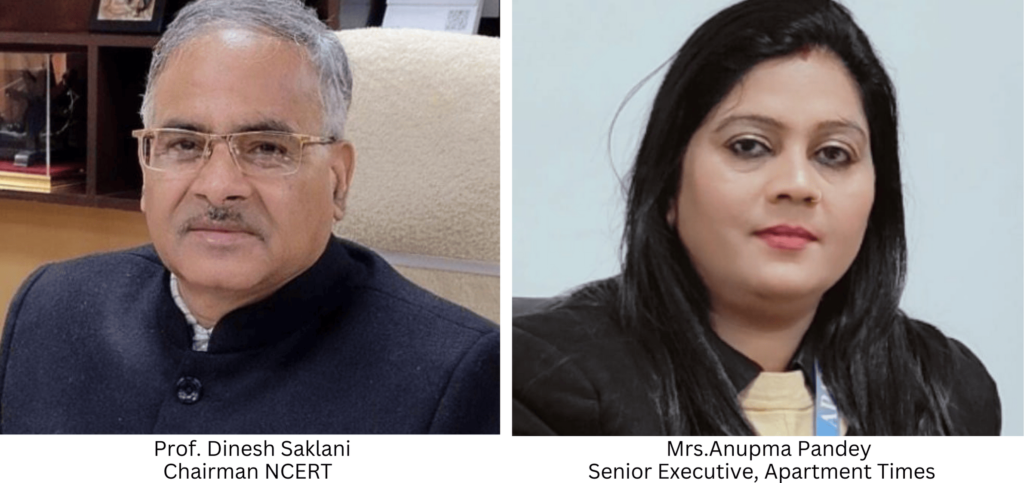Education is the backbone of any nation. It shapes most of the dimensions of growth for future. In the past few years our education system has witnessed a paradigm shift owing to the New Education Policy. The implementation has to be meticulously monitored in order to get maximum benefit out of the new system. Towards this, senior executive, Apartment Times, Anupma Pandey had an opportunity to interact with Prof. Dinesh Saklani, Chairman, NCERT. An exhaustive sketch of the Chairman’s response is as follows.

Anupma Pandey: NEP has been implemented in the new session. What is new and different in this?
Prof. Dinesh Saklani : Major initiatives and changes mark the New Education Policy. At the Foundational Stage, many initiatives have been undertaken to strengthen foundational literacy and numeracy. The following programs have been largely emphasized:
- Vidya Pravesh- a 3-month school preparation module for children entering grade 1 brought out by the NCERT is being implemented in the States and UTs. NCERT’s study in this regard with six states – Maharashtra, Odisha, Delhi, A&N Island, Puducherry and Rajasthan show positive impact of Vidya Pravesh on children’s competencies with three months. Data analysis is in progress.
- NCERT came out with Jaadui Pitara- a collection of learning-teaching material including posters, puppets, alphabet and number cards, mathematical games, toys, magic tricks, etc. for children in the age-group of 3-8 years. E-Jaadui Pitara has also been launched. This is gaining popularity and state/UTs have also been making efforts in this direction.
- Textbooks for Grades 1 and 2 have already been brought out including content and activities in such a manner to promote literacy and numeracy, critical thinking, decision making, integration of arts, health, environmental concerns, etc.
- These textbooks are welcomed by schools affiliated to CBSE. This year states are also in the process of implementing these textbooks.
Anupma Pandey: What change have you found in the level of education post implementation of NEP?
Prof. Dinesh Saklani : Changes in terms of restructuring of stages of school education into foundational, preparatory, middle and secondary with respect to curriculum and pedagogic reform can be observed as milestones of implementation of NEP 2020. NCERT has also brought out textbooks for Grade 3 -first grade of preparatory stage and will introduce Grade 6 textbooks in this academic year 2024-25 once school will prepare children for curriculum transition. For this purpose, NCERT has brought out Bridge-month programme for Grade 6 and two-week foundation programme for Grade -3 in new curricular areas- The World Around Us, Art Education and Physical Education.
Anupma Pandey: What is the use of third language in the new education policy?
Prof. Dinesh Saklani : Third Language has been given importance in order to equip students with wider range of comprehension.The NEP 2020 on its page no. 13 states that the three-language formula will continue to be implemented while keeping in mind the Constitutional provisions, aspirations of the people, regions, and the Union, and the need to promote multilingualism as well as promote national unity. However, there will be a greater flexibility in the three-language formula, and no language will be imposed on any State. The three languages learned by children will be the choices of States, regions, and of course the students themselves, so long as at least two of the three languages are native to India. In particular, students who wish to change one or more of the three languages they are studying may do so in Grade 6 or 7, as long as they are able to demonstrate basic proficiency in three languages (including one language of India at the literature level) by the end of secondary school.
As a follow-up of the NEP 2020, NCF-SE, 2023 has been developed, which states that a third Language (R3) gets introduced in the Middle Stage and requires an adequate amount of time to develop basic interpersonal communication skills. R3 has been given more time than R2 and R1 as the learning of a third unfamiliar language in the Middle Stage requires adequate time and practice.
